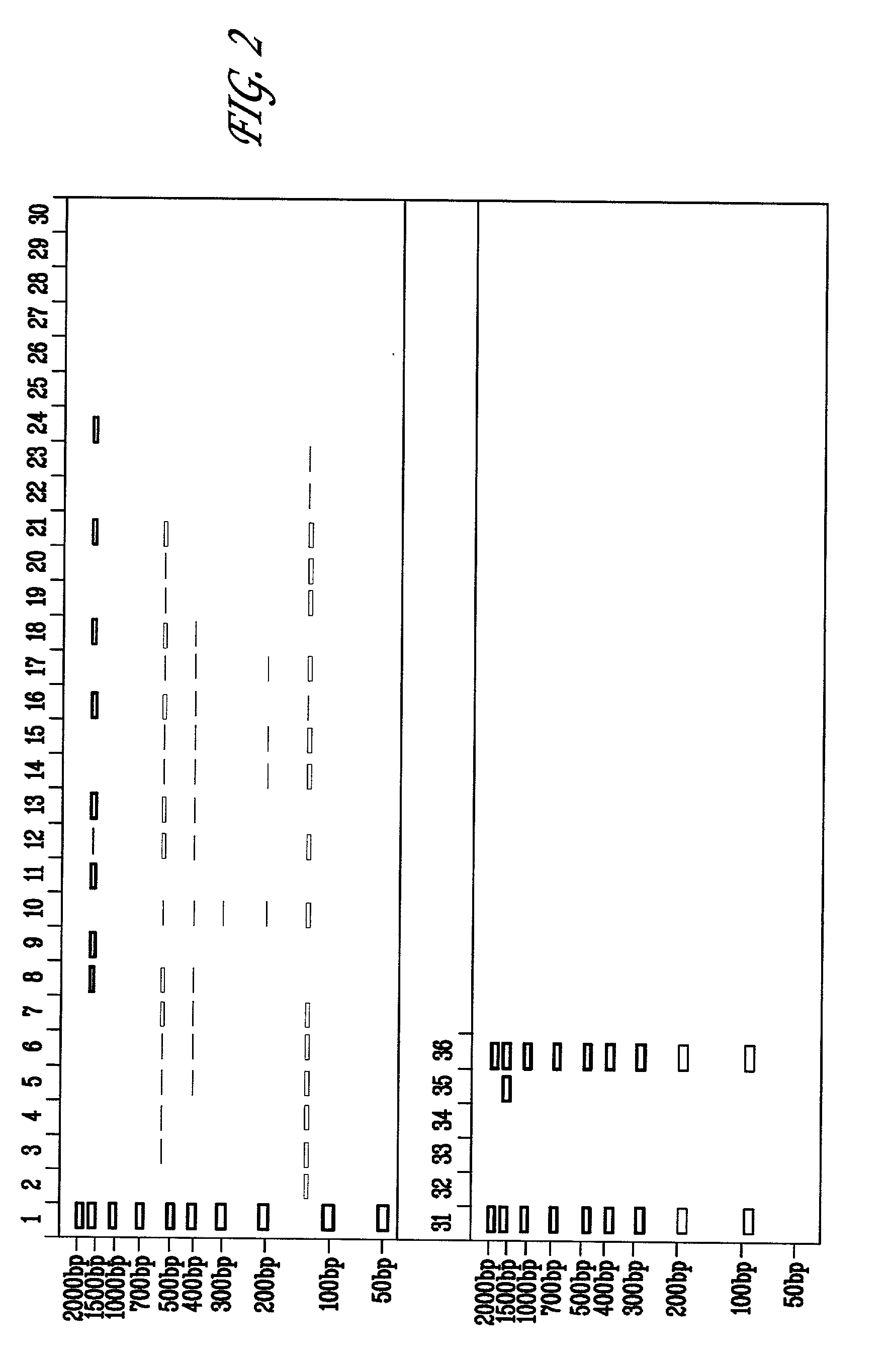Method of reducing non-specific amplification in PCR
a non-specific amplification and pcr technology, applied in the field of molecular biology, can solve the problems of difficult specific amplification of rdna sequences, non-specific amplification of dna, and frustration of analysis
- Summary
- Abstract
- Description
- Claims
- Application Information
AI Technical Summary
Problems solved by technology
Method used
Image
Examples
example 1
[0079] A titration for suitable amounts of sorbitol to reduce non-specific amplification of 16S ribosomal DNA was performed for the Escherichia coli 16S rRNA gene. 50 pg of E. coli DNA was subjected to PCR using the amplification step of the MicroSeq.TM. 16S rRNA Gene Kit in which PCR reactions are set up as follows: (a) negative controls, 50 .mu.l PCR Master Mix, 50 .mu.l sterile deionized water; (b) positive controls, 50 .mu.l PCR Master Mix, 50 .mu.l positive control DNA; (c) samples, 50 .mu.l PCR Master Mix, 50 .mu.l of 50 ng diluted E. coli DNA. Furthermore, each reaction contained AmpErase.RTM. Uracil N-glycosylase (UNG). Typically, UNG may be added in an amount of 0.5 to 2 units / reaction. The initial amplifications were performed as follows: 50.degree. C. for 10 minutes, 95.degree. C. for 10 minutes, followed by 35 cycles of 95.degree. C. for 30 seconds, 60.degree. C. for 30 seconds and 72.degree. C. for 45 seconds; followed by a final extension step at 72.degree. C. for 10 m...
example 2
[0082] A titration for suitable amounts of DMSO to reduce non-specific amplification of 16S ribosomal DNA was performed for the Escherichia coli 16S rRNA gene. 50 pg of E. coli DNA was subjected to PCR using the amplification step of the MicroSeq.TM. 16S rRNA Gene Kit in which PCR reactions were set up as follows: (a) negative controls, 50 .mu.l PCR Master Mix, 50 .mu.l sterile deionized water; (b) positive controls, 50 .mu.l PCR Master Mix, 50 .mu.l positive control DNA; (c) samples, 50 .mu.l PCR Master Mix, 50 .mu.l of 50 ng diluted E. coli DNA. Furthermore, each reaction contained AmpErase.RTM. Uracil N-glycosylase (UNG). Typically, UNG may be added in an amount of 0.5 to 2 units / reaction. The initial amplifications were performed as follows: 50.degree. C. for 10 minutes, 95.degree. C. for 10 minutes, followed by 35 cycles of 95.degree. C. for 30 seconds, 60.degree. C. for 30 seconds and 72.degree. C. for 45 seconds; followed by a final extension step at 72.degree. C. for 10 minu...
example 3
[0085] The effect of adding sorbitol and DMSO to reduce non-specific amplification of 16S ribosomal DNA was performed for the Escherichia coli 16S rRNA gene. 5, 50, or 500 pg of E. coli DNA was subjected to PCR using the amplification step of the MicroSeq.TM. 16S rRNA Gene Kit in the presence of 0.15M sorbitol, or 0.15 M sorbitol+1.25% (vol / vol) DMSO. The PCR reactions were set up as follows: (a) negative controls, 50 .mu.l PCR Master Mix, 50 .mu.l sterile deionized water; (b) positive controls, 50 .mu.l PCR Master Mix, 50 .mu.l positive control DNA; (c) samples, 50 .mu.l PCR Master Mix, 50 .mu.l of 50 ng diluted E. coli DNA. Furthermore, each reaction contained AmpErase.RTM. Uracil N-glycosylase (UNG). Typically, UNG may be added in an amount of 0.5 to 2 units / reaction. The initial amplifications were performed as follows: 50.degree. C. for 10 minutes, 95.degree. C. for 10 minutes, followed by 30 cycles of 95.degree. C. for 30 seconds, 60.degree. C. for 30 seconds and 72.degree. C....
PUM
| Property | Measurement | Unit |
|---|---|---|
| temperature | aaaaa | aaaaa |
| temperature | aaaaa | aaaaa |
| temperature | aaaaa | aaaaa |
Abstract
Description
Claims
Application Information
 Login to View More
Login to View More - R&D
- Intellectual Property
- Life Sciences
- Materials
- Tech Scout
- Unparalleled Data Quality
- Higher Quality Content
- 60% Fewer Hallucinations
Browse by: Latest US Patents, China's latest patents, Technical Efficacy Thesaurus, Application Domain, Technology Topic, Popular Technical Reports.
© 2025 PatSnap. All rights reserved.Legal|Privacy policy|Modern Slavery Act Transparency Statement|Sitemap|About US| Contact US: help@patsnap.com



